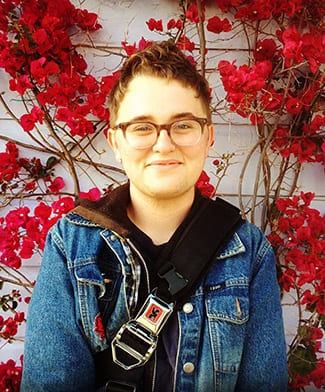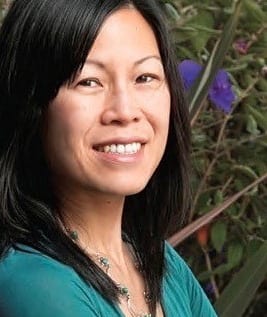By Andrew Cohen

It was high-stakes for the East Bay Community Law Center (EBCLC), representing a trafficking victim for the first time. It was high stakes for EBCLC student Asher Waite-Jones ’16, pursuing a visa for a detained client badly in need of help. And it was the highest of stakes for Lynden, who asked not to use her last name, an undocumented transgender woman from Belize facing possible deportation.
“Trafficking victims are particularly vulnerable, and we’re trying to reach out to this population and develop our expertise,” said Linda Tam, the director of EBCLC’s Immigration Program. “We’re one of only a few nonprofits in the Bay Area providing this service, so it’s an area of great need that we’d like to fill.”
Formed by Berkeley Law students in 1988, EBCLC is now the East Bay’s largest provider of free legal services—and the school’s largest clinical offering. Each year, more than 100 students help the clinic serve more than 5,000 clients in several placement areas.
EBCLC worked closely with Lynden, who was picked up by police in 2000 after overstaying the temporary visa she had obtained in 1983 to visit her mother in the United States. She was placed into removal proceedings by immigration authorities who sought to deport her for not having legal permission to be in the U.S. Because she never received notice of the court hearing, she did not attend and was ordered removed. Almost 15 years later, Immigration and Customs Enforcement (ICE) showed up at Lynden’s door and detained her based on the prior removal order.
ICE was in the process of obtaining a passport for Lynden—to deport her to Belize—when she contacted EBCLC for help. Relying on the hearing notice issue, Tam managed to get the removal order rescinded and Lynden’s case re-opened.
Springing into action
“We thought Lynden had a strong asylum claim based on her gender identity and also a potential human trafficking or victim of crime case,” Waite-Jones said. Lynden was in ICE custody for more than two months. “She was being detained, which is rough for anyone—especially if you’re queer or aren’t gender-conforming. We had to act quickly.”

EBCLC’s immigration team helped Lynden decide whether to pursue a U-visa or a T-visa, both created to help undocumented victims of particular crimes gain legal status. T-visa applicants must have been victims of severe forms of trafficking, such as labor or sex trafficking. Lynden pursued a T-visa because the requirements for law enforcement certification are not as strict, giving trauma survivors more choice about how they interact with law enforcement.
“Those certification requirements raised some safety concerns for her,” Waite-Jones said. “T-visas have more leeway in that regard, and they’re ruled upon faster—in about six months—because fewer people apply for them. With a U-visa, applicants wait years for a grant.”
Waite-Jones’ first task: getting Lynden out of detention. He went to court and successfully advocated for a reasonable bond amount. After a friend posted the bond that same day, Lynden soon began meeting regularly with Waite-Jones to prepare her visa application.
“It’s hard to talk so in depth with someone about the worst trauma they’ve gone through, trauma worse than most of us will ever face,” Waite-Jones said. “But the visa application must be very detailed, and we worked through six drafts to make it as airtight as possible.”
Building trust
While he never directly told Lynden that he too is transgender, Waite-Jones saw it help develop an early level of trust. “It seemed there was a sense of relief there, that I could understand some of the challenges Lynden has been through,” he said. “But in the end, it comes down what kind of help you can provide.”
Tam called it “very meaningful to see Asher work on this case because of some experiences in common that he shared with the client.” She acknowledged, “On a personal level, it’s often challenging when a case or client’s life hits so close to home.”
In addition to representing Lynden at the bond hearing, Waite-Jones prepared her entire multi-layered filing with U.S. Citizen and Immigration Services. Six months later, he responded effectively to the agency’s request for further evidence. “It was exciting to have a student get involved in so many aspects of one case,” Tam said.
Perhaps the hardest part of the experience? Waiting for the final outcome. When word came that Lynden’s visa application had been approved, a raucous celebration ensued.
“I must have jumped three feet in the air,” Waite-Jones said. “Now that Lynden is no longer undocumented, she has a work permit and can lawfully be employed in the U.S. It’s a four-year visa, but at the end of three years she can apply for permanent legal status. It’s a great victory for us at EBCLC, but more importantly a life-changing victory for Lynden.”